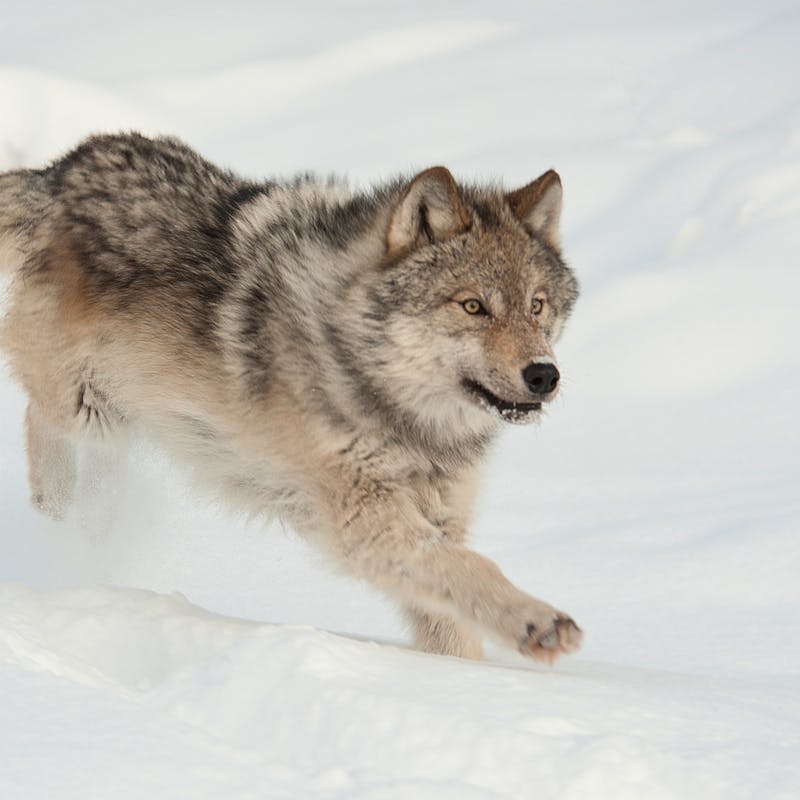In a recent public hearing, Aimee Delach, senior climate adaption policy analyst with Defenders of Wildlife, provided public comment on the White House Council on Environmental Quality’s (CEQ) proposals to revise the 2020 regulations implementing the National Environmental Policy Act (NEPA).
“While it is especially reassuring to see proposed rulemakings that would allow agencies to adequately consider a project’s effect on wildlife, habitat and climate, there is still a lot of work to be done to undo the damaging rollbacks made under the previous administration,” said Delach. “We look forward to providing comments when CEQ releases Phase 2 proposals to help ensure the adoption of proposals that consider environmental justice and equity.”'
The hearing sought public comments on the release of CEQ’s “Phase One” proposals and is the first of a two-part effort to restore NEPA.
Of the changes proposed under “Phase One,” Defenders supports the following:
1. Restore appropriate definition of environmental impacts. Federal decisions regarding land management, mining and drilling, and infrastructure projects all have consequences for wildlife, habitat and the climate. The 2020 regulations removed several types of “effects” that agencies must analyze, making it less likely that they would give adequate attention to them. One is “indirect” effects such as the construction of a new road that would destroy habitat. Another is “cumulative” effects, the combined impact of all the actions that lead to “death by a thousand cuts” for species and habitats. The 2020 rule also added language that could prevent agencies from considering climate change and its effects. Defenders supports the reinstatement of the definitions of “effects” to the prior, longstanding 1978 NEPA regulations. Restoring this safeguard would mean that federal agencies are once again required to evaluate the full suite of environmental impacts of an action.
2. Restore the definition of purpose and need. One of the main reasons NEPA was established is to give communities a voice when faced with federal projects that may profoundly affect their lives. Changes in the 2020 rule forced agencies to prioritize the needs of the developer proposing the project, not the needs of the affected community. Restoring the definition of “purpose and need” to its prior language would rightfully shift the focus from the developer to the community and allow for the consideration of alternative approaches that minimize impacts to the communities and surrounding habitats.
3. Reinstate adequate reviews. The 2020 rules also upended 50 years of precedent that gave agencies the flexibility to develop procedures that were more protective than the “floor” set by NEPA regulations. For instance, the U.S. Fish and Wildlife Service has detailed procedures for analyzing specific topics like how a project might affect endangered species. The 2020 regulations eliminated agency flexibility by asserting the CEQ regulations represented the “ceiling” that agencies were prohibited from exceeding. Eliminating that language strengthens the environmental review standards that federal agencies should be meeting.
“This first phase is progress, but it by no means, fixes all of the many problems of the 2020 NEPA regulation,” said Delach. “We hope that CEQ will move quickly with a “Phase 2” rulemaking effort to address the damage still left undone.”
The 2020 rule removed impacts to endangered species and their habitat from the list of factors that add up to a project “significantly” affecting the environment. It also deleted guidance to agencies on how to evaluate impacts to biodiversity, inappropriately eliminated the requirement to disclose conflicts of interest, attempted to curtail public involvement and obstructed judicial review.
For over 75 years, Defenders of Wildlife has remained dedicated to protecting all native animals and plants in their natural communities. With a nationwide network of nearly 2.1 million members and activists, Defenders of Wildlife is a leading advocate for innovative solutions to safeguard our wildlife for generations to come. To learn more, please visit https://defenders.org/newsroom or follow us on X @Defenders.
Media Contact
News

Defenders Celebrates Win for Amargosa Valley Wildlife Hotspot
